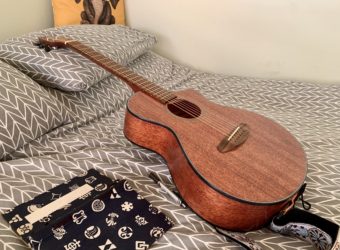
My Wildwood—A tale of my Companion and its origin story
Musician/journalist Ari Tibi, Breedlove’s Featured Artist for August, talks shop and sustainability
I saw it on the wall at NAMM, the annual January music convention in Anaheim, California, hanging near a sign that said Organic atop a picture of a forest. The scene ignited a feeling of beauty, nourishment and balance and I immediately had to play it. I later learned that my intuition was right: not only do they bear an impressively divine sound, but Breedlove Organic Collection models are sustainably sourced in an effort to protect and rejuvenate rainforests.
The Organic Wildwood Companion was the first guitar that I picked up that day, not yet knowing where it came from. That dark African mahogany engulfed me like indulging in rich chocolate, and, because of its size, I began to quietly finger pick: smooth, light, and surprisingly warm. I soon fell into a strum pattern and a vibrant, luscious sound came pouring out. The tone of the strings is so well-designed that they each have their own hue, their own flavor, that combine for a gorgeous resonance. I went home with it immediately and a couple nights later, wrote my first Wildwood song: ‘Shelter.’ The song sums up the benefits of my Wildwood, with sweet arpeggios before a chanting chorus.
Most of my songs combine finger picking with big choruses, and I’ve been writing them on my Breedlove Solo for almost a decade. As the only acoustic guitar I’d ever owned (before the Wildwood), the body of that guitar brought out songs in me that begged for an audience to sing along, and it supported three big voices in my trio, Luci. The finger picking was always strongly amplified, and it held up as the rhythm axe for all of our live shows. Alongside a full band with horns, keys and drums, that guitar sold out the Troubadour!
But for a long time, I’d been craving a bedroom guitar: a small friend to churn out those songs in the middle of the night or in writing sessions with the girls. Something that would whisper as I did, when the ideas were too young to be heard by anyone else. I quickly found that intimacy in the Wildwood, but I never expected that, when plugged in, it would hold its own on a stage, as proud as the Solo.
Aside from the sound, one of the most magical elements of the Wildwood is its origin story. Born from wood in the Congo River Basin, the world’s second largest rainforest, the guitar was consciously made, very much in tandem with the local community.
“We are committed to the entire ecosystem,” says Breedlove owner Tom Bedell, who travels to every forest and mill he sources from, insisting on using Forest Stewardship Council-certified wood. No clear-cut trees are ever used in Organic Collection guitars, only individually-harvested ones that actually help the forest heal itself by being culled.
What does it look like to be that committed to sustainability, and why should we be? First, the why: A single rainforest is home to millions of species, and tropical deforestation is the second largest contributor to climate change. This mass erosion produces carbon emissions that trap heat in our atmosphere, which cyclically harms other species. As Tom says, in order to live here, we have to be committed to working within the entire ecosystem. Breedlove has made the conscious, timely choice to make a difference in their industry.
“They cut less than two percent of any given carefully mapped section,” Bedell says. “When they haul those few trees out, they then close up that section and they don’t go back into that area for 30 years, so that the forest rejuvenates itself, which happens even faster than that. They’re trying to minimize their footprint in the forest.”
Additionally, the Congolaise Industrielle Des Bois S.A. company has built housing, schools, and hospitals for workers, families and the indigenous forest population, who also receive free treatment and medication. CIB, based in Ouesso, Republic of Congo, employs almost 1,000 Congolese in Pokola and is similarly devoted to a cyclical environment. “They pull water out of the river,” Bedell says, “and purify it all. They provide it to the entire town… They recycle, taking all of the sawdust and wood waste product they generate from the mill and using it to create energy.”
In my free time, I work with a non-profit organization to push for policies that reflect a green, livable future and for communities to remain unaffected by harmful extractions. But with the Wildwood, I can rest easy. It helps too, that the Breedlove family is just that: family. Since becoming a Breedlove Featured Artist, I’ve never felt so welcomed by a brand, let alone honored to help represent it.




